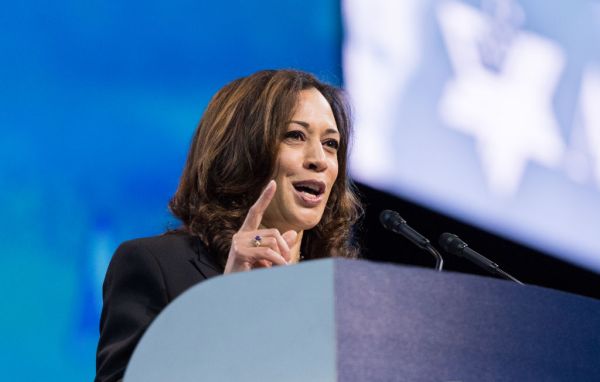Happy Friday! Tomorrow will mark 100 days until Election Day. In a Very Special Episode of Dispatch Politics, we thought we’d update you on the state of play in the presidential election and congressional races at this critical juncture.
Up to Speed
- With his family just offscreen, President Joe Biden addressed the nation from the Oval Office on Wednesday to explain his decision to end his White House campaign. “In recent weeks, it has become clear to me that I needed to unite my party in this critical endeavor,” he said. “I believe my record as president, my leadership in the world, my vision for America’s future, all merited a second term. But nothing, nothing can come in the way of saving our democracy. That includes personal ambition.” The speech was Biden’s first public appearance since announcing that he was dropping out of the race on X.
- Vice President Kamala Harris trails former President Donald Trump by 5 percentage points in Arizona; by 2 points in Georgia, by 1 point in Michigan; and by 2 points in Pennsylvania, per an Emerson College poll of battleground states released Thursday. The two candidates are tied in Wisconsin. However, her margin is much closer than Biden’s was just last week. Nationally, a new New York Times/Siena College poll shows Trump ahead of Harris, 48 percent to 47 percent.
- Barack Obama and his wife, Michelle, have endorsed Harris, her campaign announced Friday. The video appears to show Harris taking a call from the Obamas backstage before her keynote address to the Zeta Phi Beta sorority’s convention in Indianapolis on Wednesday. “We called to say, Michelle and I couldn’t be prouder to endorse you and do everything we can to get you through this election and into the Oval Office,” said the former president.
- Six vulnerable House Democrats—Reps. Jared Golden of Maine, Yadira Caraveo of Colorado, Don Davis of North Carolina, Marie Gluesenkamp Perez of Washington, Henry Cuellar of Texas, and Mary Peltola of Alaska—voted with Republicans Thursday to pass a symbolic resolution criticizing Harris’ work on the border. Illegal immigration has become a political vulnerability for Democrats, and Republicans have repeatedly claimed Biden appointed Harris as a “border czar,” a claim that has some merit due to the ambiguity with which the administration defined her role. On Friday morning, one of those members, Davis, endorsed Harris.
- In an interview Thursday evening on Donald Trump Jr.’s podcast, Republican vice presidential nominee J.D. Vance criticized Harris’ record. “Kamala Harris consistently [was] the most liberal senator in the entire United States Senate, and now they’re going to rebrand her as a right-wing Democrat,” said Vance. Notably, he also floated the idea that Democrats may not be fully committed to Harris as their nominee. “It would not shock me if this was another trial balloon. Joe Biden was trial balloon number one,” he said. “Now Kamala Harris is the new trial balloon—let’s see how her poll numbers are for the next few weeks and see what happens there. It’s fundamentally undemocratic.”
- Leaders of both parties condemned a Wednesday demonstration in which a mob protesting the visit of Israeli Prime Minister Benjamin Netanyahu to Congress burned an American flag, assaulted police, and painted pro-Hamas graffiti on monuments outside Washington’s Union Station. “I support the right to peacefully protest, but let’s be clear: Antisemitism, hate, and violence of any kind have no place in our nation,” Harris said in a statement Thursday. House Minority Leader Hakeem Jeffries the same day accused the demonstrators of promoting terrorist groups and threatening violence against Jews, calling both actions “not acceptable under any circumstance.” Late Wednesday evening, a group of House Republicans, including Speaker Mike Johnson, replaced the American flags the protestors had taken down.
- Progressive lawmakers who have been less supportive of Israel amid its war in Gaza also condemned the protestors’ behavior. “It’s horrible, man. That’s not what these protests are supposed to be about,” Rep. Jamaal Bowman of New York, who lost last month to a pro-Israel primary challenger, told Dispatch Politics Thursday. “It’s supposed to be about peace and justice and nonviolence. We cannot stoke additional violence. You can’t be burning flags, can’t be talking about we gonna kill Jews. Like, that’s crazy. That is not what this is supposed to be about.” Sen. Bernie Sanders of Vermont called it “outrageous” and “unacceptable behavior.”
- A brief update on the push by Nikki Haley’s campaign to have an outside political group, Haley Voters for Harris, stop using her name. After receiving a cease-and-desist letter earlier this week, the group told Dispatch Politics it was considering its options. But on Thursday, Haley Voters for Harris (formerly Haley Voters for Biden) fired back with a response in the form of a press release that it would continue to use the name and that, despite the suggestion from Haley’s campaign that it violated election law, the group is fully within its legal rights. “The letter misstates federal election law. PivotPAC is the independent expenditure committee registered with the FEC. Haley Voters for Harris is a campaign of PivotPAC,” said the release. “Accordingly, there is no use of Ambassador Haley’s name on the registered committee.”
Biden Exits, Harris Enters, Trump Forced to Adjust

As we mentioned up top, Saturday marks 100 days before Election Day. It also marks only five days since Vice President Kamala Harris replaced President Joe Biden as the Democratic Party’s presumptive 2024 nominee, a historically unusual development that pushes the White House race into uncharted territory.
Dogged by voters’ concerns about age and infirmity, the 81-year-old Biden was a clear underdog in his rematch with former President Donald Trump, 78, at a critical point in the presidential campaign. Polls showed Trump’s advantage over Biden, nationally and in key battleground states, growing on an almost straight-line trajectory, suggesting the president faced slim chances for recovery. But Harris has made the contest newly competitive and scrambled Trump’s carefully planned general election strategy, if only for the moment.
“The race will change in monumental ways. How, actually, it will change is yet to be seen,” Jeff Brauer, a political science professor at Keystone College, near Scranton, Pennsylvania, told Dispatch Politics. “That, itself, is highly unusual for a presidential race only 100 days out.”
Until late last month, it seemed the U.S. was headed for the first White House rematch since President Dwight D. Eisenhower defeated Democrat Adlai Stevenson in 1956. From the outset of the 2024 campaign, polls showed voters unhappy with Biden and Trump, but it also revealed particular dissatisfaction with the sitting president.
Everything changed during the span of a tumultuous three-and-a-half weeks.
On June 27, Biden bombed in a debate with Trump, sparking Democratic calls for him to drop his reelection bid. Speculation about the president’s future turned into a daily drama, driven by a slow and steady drip of party stalwarts urging him to step aside. Amid this, Trump escaped an assassination attempt; picked Sen. J.D. Vance of Ohio to be his running mate; and accepted the Republican nomination at a unified GOP convention in Milwaukee. Finally, on Sunday, Biden stood down and endorsed Harris.
Not since 1968 had a sitting president pull the plug on his reelection campaign—and Lyndon Baines Johnson did so in the spring, five months before the Democratic convention, which, like this year’s, was in Chicago. Biden bowed out with just four weeks to go until Democrats gather to crown the 2024 ticket. By Monday night, the vice president had the support of enough Democratic delegates to become the presumptive nominee. After all that’s happened, his party can hardly believe its luck.
“This is a wide-open race,” veteran Democratic strategist Rodell Mollineau said. “The pendulum hasn’t completely shifted. But from where Democrats were, it’s quite a sea change.”
Last Friday, Trump’s lead over Biden stood at 3 percentage points in the RealClearPolitics average of national polls. Today, the former president leads Harris, 59, by 1.9 points. Barring a surprise at the Democratic convention in Chicago on August 18-22, this new campaign—a 100-day sprint—is immediately more dynamic and less predictable than the contest pitting the former president against his successor.
Harris brings energy and vigor to the campaign trail.
The vice president has revitalized a Democratic electorate—elite, grassroots, and otherwise—that was resigned to a Trump victory and turning its attention to down-ticket contests. Party sources tell us she is agile in a way Biden, even at his best, was not. Harris’ youth and agility as a public speaker, they say, equip her to counter the asymmetrical attacks from Trump that often flummox his opponents, while simultaneously able to go on the offensive with a future-oriented message that can make a credible case to voters that she is the “change” candidate.
Trump’s lead over Biden—nationally and in key battleground states—was durable, dating back almost a year. Now, with Harris, Democrats at least have an opportunity to make the 2024 contest about the 45th president and the myriad weaknesses and vulnerabilities that led to his defeat in 2020 (to say nothing of his provocative behavior and rhetoric since then). However, Harris also brings to this contest a host of her own weaknesses and vulnerabilities, including, as our own John McCormack reports on the site today, her progressive policy record.
And that’s aside from an often-overlooked aspect of this campaign: Trump remains the favorite in this race and might be a stronger, more formidable candidate than at any time in his three White House bids. “Most of the issues on voters’ minds this year play to Trump—the economy, immigration, and the world in chaos with bad guys on the march,” Republican strategist Brad Todd said.
“I am not sure if Democrats understand that their political problem is not just rooted in Joe Biden’s age, but in a rejection of how far left the administration went,” he added. “If she doesn’t understand that, she probably loses.”
Indeed, Biden’s problems went beyond his age and the impression that he was physically and mentally incapable of serving a second term, at the end of which he would be 86 years old: Sky-high inflation, the sort not experienced in decades, has cooled, but the cost of household goods are still at inflation-level highs. Interest rates, raised by the Federal Reserve to combat inflation (a plan that appears to be working), have increased borrowing costs, whether for credit cards or homes. Illegal border crossings have lately declined, but illegal immigration—and crimes committed by migrants gaming U.S. asylum law—spiked for three years after Biden took office, a result of his decision to throw out Trump administration security policies.
Harris might be largely undefined in the eyes of voters—another potential strength—and Trump might be casting about for a new campaign strategy, having had the vice president foisted on him just days ago.
But the former president can credibly tie Harris to virtually all of the Biden administration’s problems, (regardless of whether or not it’s fair to call her the “border czar.”) And that was just domestically. Overseas, Biden’s record, however exemplary, includes a botched U.S. pullout from Afghanistan, Russia invading Ukraine, and the deadly Hamas incursion into Israel. Expect Trump and his team to attempt to fill in the blanks on the vice president in short order. In fact, it’s already started.
“Harris has high name-ID, but [she is] not well-known. R’s already starting to define her,” Amy Walter, a nonpartisan political analyst, said in a post on X. Yet to be seen, added Walter, publisher and editor-in-chief of The Cook Report with Amy Walter, is whether Democrats “decide [it’s] better to use their [money] getting Trump back into the focus, or trying to push back on” attacks that paint Harris as “too liberal.”
A Favorable Senate Outlook for the GOP
Biden’s withdrawal from the presidential race has not altered the fundamental picture of the contests that will determine control of the United States Senate. Republicans remain in a good position to gain multiple seats in the upper chamber, no matter who wins the White House, while Democrats have plenty of incumbents in red and purple states that need defending.
But fears that the bottom would drop out for Democratic senators who were running curiously ahead of Joe Biden as the president’s poll numbers spiraled downward have been allayed, at least temporarily. And with Kamala Harris seeming to stabilize the presidential race back to a narrow lead with a Donald Trump advantage, the fight for the Senate majority looks like it could be just as narrow with 100 days left to go.
It’s worth remembering that Republicans are almost certain to flip a Senate seat thanks to the retirement of Democrat-turned-independent Joe Manchin, who has kept his West Virginia seat out of the GOP’s hands despite the state’s hard turn to the right. There’s little reason to believe Republican Gov. Jim Justice will not win his race to succeed Manchin in the Senate handily. So, even if both parties hold each of their remaining seats, the GOP can count on coming into the Senate in January with 50 seats.
And there are numerous opportunities for Republicans to pick up seats elsewhere and grow that majority even larger, especially if a wave of anti-Democratic sentiment crests in November. The Democrats with the best chance to hold on, meanwhile, are those with a political profile that’s distinct from the national party.
The red-state Democratic incumbents.
Even in a less competitive state, a presidential race can bring out infrequent partisan voters who will pull the lever down-ballot, too. That’s why two red-state Democrats, from Ohio and Montana, are at risk of losing their respective bids for a fourth term.
Once a bellwether for presidential races, Ohio is now solidly Republican from the top of the ballot on down, including voting for Trump twice. That said, Sen. Sherrod Brown, a Democrat first elected in 2006, has hung on as the Buckeye State has shifted rightward. But Republican nominee Bernie Moreno is giving Brown his toughest challenge yet.
A handful of polls show Brown with a small lead over Moreno, and the Democratic incumbent is even topping out above 50 percent—always a good sign for an incumbent in an otherwise difficult environment. Still, Moreno’s position in the mid-40s is likely to improve thanks to the Trump coattails. And while Brown has won by healthy margins in the past by crafting an identity independent of the national party, Moreno may test the limits of that in this hyperpolarized environment.
That dynamic is also at work in Montana, where Trump won by 16 points in 2020 and Republican Sen. Steve Daines defeated popular former Democratic Gov. Steve Bullock by 10 points the same year. This year, incumbent Democratic Sen. Jon Tester, another from the class of 2006, is fighting for a fourth term.
But polling shows that, unlike Brown, Tester is running several points under 50 percent and is at best running even with his Republican challenger, former Navy SEAL Tim Sheehy. Sheehy’s ads draw a direct line between Biden’s record and Tester, so with the president performing even worse in early polls than his final performance in 2020, Tester has his work cut out for him. Interestingly, Tester is the only Democratic senator who has yet to endorse Harris, his former colleague, since her White House bid began this week.
The battlegrounds.
Democrats are defending Senate seats in five of the major battleground states: Pennsylvania, Michigan, Wisconsin, Arizona, and Nevada. The results of the presidential race in each one will go a long way in determining how many of those seats Republicans can snatch away. In nearly every poll, the Democratic Senate candidates were running well ahead of Biden.
The GOP’s best chance in this tranche could be in Nevada, a state Republicans haven’t won at the presidential level since George W. Bush did so in 2004. There, first-term Democrat Jacky Rosen has had to fight to overcome Biden’s cratering approval rating in Nevada, which hit 37 percent last month, below even the national rating. Rosen has also drawn an impressive Republican opponent in Sam Brown, an Afghanistan veteran who sustained serious burn injuries from an IED explosion. Polling has shown Rosen running ahead of Brown, but not by much, and Democrats worry she may not have enough time to define herself apart from her party. With Trump in a comfortable lead in Nevada over Biden before the president withdrew, Brown may have more room than Rosen to grow his support in the final months of the race.
Democrats should feel better about their incumbents in Wisconsin and Pennsylvania. In the Badger State, Sen. Tammy Baldwin has established her own identity and is viewed favorably enough by Wisconsin voters to overcome Biden’s underwater numbers there. She leads her Republican challenger, businessman Eric Hovde, by single digits. The same goes for Pennsylvania, where longtime incumbent Sen. Bob Casey, the Democrat, has held a consistent lead over Republican Dave McCormick, despite the stable lead Trump has held over Biden in the Keystone State.
Michigan provides another pickup opportunity for Republicans because the retirement of incumbent Democratic Sen. Debbie Stabenow has opened up the seat. The party primaries will be held on August 6, but the leading candidates on each side are Rep. Elissa Slotkin, the Democrat, and former Rep. Mike Rogers, the Republican. In the scant polling of that matchup, Slotkin has led Rogers, but there will likely be a clearer picture of the race after both candidates are nominated.
Another open seat is in Arizona, where the independent Sen. Kyrsten Sinema, who caucuses with the Democrats, is retiring. In another year, Rep. Ruben Gallego, the likely Democratic nominee after next week’s primary, might be too progressive for the state. But he has been holding a solid lead over likely Republican nominee Kari Lake. That can probably be attributed to Lake’s reputation in Arizona as the face of the “Stop the Steal” movement, when Republicans tried unsuccessfully to prove voter fraud delivered the state to Biden in the 2020 election. Her embrace of those efforts and her total alignment with Trump hampered her unsuccessful gubernatorial run in 2022 and could be having residual effects on her Senate bid now. But with Biden out and Harris in, border and immigration politics could redound to Lake’s benefit, thanks to Harris being tasked as the administration’s leader on border issues. But as one of the narrowest states for Biden in 2020, Arizona, like other battlegrounds, could be driven just as much by how the presidential race ends up.
The wild card.
Republican Larry Hogan—the popular, relatively moderate two-term governor of Maryland—surprised just about everyone when he jumped into the Senate race to succeed retiring Democrat Ben Cardin. A staunch Trump critic who had previously expressed no interest in being a senator, Hogan suddenly put the solid-blue state of Maryland on the Senate map, if for no other reason than his extensive fundraising efforts and reputation meant whoever won the Democratic nomination would not be able to simply waltz into office.
Or maybe she could. The Democratic nominee is Prince George’s County executive Angela Alsobrooks, a favorite of the state’s party establishment who early polls show is leading Hogan comfortably. Hogan’s path to victory rested partially on a lack of Democratic enthusiasm for Biden’s candidacy at the top of the ticket. Harris’ ascension to the nomination complicates those efforts, in no small part because her candidacy might energize Maryland’s substantial black electorate.
On the other hand, with Democrats spread thin across the country, Alsobrooks will have to be on guard for any surge from Hogan—the money to fight back on the airwaves and online may be tied up defending seats in battleground states. Democrats may be feeling better about Maryland than they were a few months ago, but the Hogan threat typifies how, when it comes to Senate races, Democrats just can’t seem to catch a break in 2024.
Republicans in the Driver’s Seat for Control of the House
In the race for the House of Representatives, Republicans are in an advantageous position to retain their majority this fall.
Harris’ status as the likely Democratic nominee has improved Democrats’ chances, but the dynamics of the map and the GOP apparently having learned a lesson about the broader appeal of more mainstream candidates has put them in a tough position, meaning they need to win more close races than their Republican opponents.
“Today, Democrats would still need to win the lion’s share of toss-ups to win the majority, about two-thirds of the races that we currently have as toss-ups,” Dave Wasserman, senior editor of The Cook Political Report, told Dispatch Politics. “And it’s also worth noting that Republicans appear to be polling better in more toss-ups than Democrats today. Now, Democratic incumbents are doing quite well. The problem for Democrats appears to be, they’re having a hard time against Republican incumbents, and they are also struggling in several open seats.”
Cook rates 22 House races as toss-ups. If Democrats were to win the 203 that are solidly, likely, or leaning in their direction (which is not a guarantee), they would need to emerge victorious in 15 of those toss-ups. Meanwhile, Republicans will need to win only eight toss-ups if they take all 210 races in which they are favored.
Adding to the reason for Republican optimism is that GOP primary voters have chosen candidates who have better prospects in the general election compared to the midterm cycle. This year, Republican nominees often refuse to mimic former President Donald Trump’s unpopular rhetoric, and they run on relatively moderate platforms. “In 2022 we measured that candidates who ran on more Trump-emulating themes ran about eight points behind Republicans who ran on more traditional conservatism themes,” Wasserman told Dispatch Politics.
One candidate who emulated former President Donald Trump in 2022 was Jim Bognet, who challenged Rep. Matt Cartwright in Pennsylvania’s 8th Congressional District, losing again after doing so in 2020 as well. Bognet’s Republican primary opponents attempted to cast him as a carpetbagger, giving Democrats an attack to levy in the general election, and he also made several comments casting doubt on the results of the 2020 election. This year, Republicans coalesced around the homegrown Rob Bresnahan, who did not repudiate Bognet’s rhetoric but declared that “Joe Biden is the president” in an interview with Dispatch Politics months ago. Cook rates his race with Cartwright as a toss-up.
Republican voters also made a helpful choice in Virginia’s 7th Congressional District, an open seat, thanks to Democratic Rep. Abigail Spanberger’s decision to retire from Congress and run for governor in 2025. Spanberger kept her seat by being an especially effective campaigner, and Republicans have eyed it as a pickup opportunity in her absence. The top two candidates in the GOP primary were Derrick Anderson, who held endorsements from Speaker Mike Johnson and other mainline Republicans, and Cameron Hamilton, who had the backing of many members of the right-wing House Freedom Caucus. The establishment-endorsed Anderson won the primary last month.
The GOP has also improved its chances to keep vulnerable seats. Rep. Mariannette Miller-Meeks of Iowa, who represents a district that Cook has as likely red, was one of multiple Republicans in Congress to fend off a challenger who attacked her from the right. Additionally, firebrand Rep. Lauren Boebert of Colorado chose to run in a deeper red district than her current one, which leans Republican. In the GOP primary for that seat, Reagan conservative Jeff Hurd defeated “Stop the Steal” Republican and former state Rep. Ron Hanks, who benefited from Democratic support.
But this trend is not ironclad. Republicans in Washington’s 3rd Congressional District, which Trump won by 4 points in 2020, appear poised effectively to nominate Joe Kent in next month’s primary in which the top two vote-getters advance. Kent is a far-right candidate who primaried moderate GOP Rep. Jaime Herrera Beutler in 2022 before losing to incumbent Democratic Rep. Marie Gluesenkamp Perez.
Notable and Quotable
“Given the continued political chaos surrounding crooked Joe Biden and the Democrat Party, general election debate details cannot be finalized until Democrats formally decide on their nominee. There is a strong sense by many in the Democrat Party - namely Barack Hussein Obama - that Kamala Harris is a Marxist fraud who cannot beat President Trump, and they are holding out for someone ‘better.’ Therefore, it would be inappropriate to schedule things with Harris because Democrats very well could still change their minds.”
—Former President Donald Trump’s campaign in a statement posted to X before the Harris campaign announced that the Obama family endorsed her, July 25, 2024.









Please note that we at The Dispatch hold ourselves, our work, and our commenters to a higher standard than other places on the internet. We welcome comments that foster genuine debate or discussion—including comments critical of us or our work—but responses that include ad hominem attacks on fellow Dispatch members or are intended to stoke fear and anger may be moderated.
With your membership, you only have the ability to comment on The Morning Dispatch articles. Consider upgrading to join the conversation everywhere.